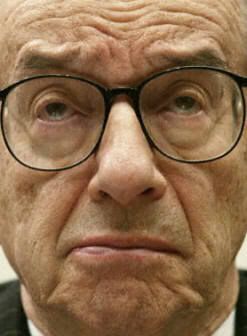LA Times: "No Blood For Oil" Lackey
 The "no blood for oil" simpleton-ideologues should all buy copies of today's LA Times because its story, Greenspan: The Iraq war is largely about oil, will become the new talking points for this contingent. Here's how the article starts ... and you don't really have to go any further than this, if you're on the Left and looking for convenient belief systems:
The "no blood for oil" simpleton-ideologues should all buy copies of today's LA Times because its story, Greenspan: The Iraq war is largely about oil, will become the new talking points for this contingent. Here's how the article starts ... and you don't really have to go any further than this, if you're on the Left and looking for convenient belief systems:WASHINGTON — "The Iraq war is largely about oil," former Federal Reserve Chairman Alan Greenspan says in his new book -- an assertion disputed by lawmakers and the U.S. Defense secretary.The reporter is pulling quotes directly from the book, so it must be accurate and true, right? Well, before we jump to such conclusions, let's look to another source. No, not a conservative Republican source. Let's look one of the two papers the LA Times so unsuccessfully emulates, the Washington Post, which much more carefully titled its story Greenspan: Ouster of Hussein Crucial for Oil Security:
"I'm saddened that it is politically inconvenient to acknowledge what everyone knows," Greenspan, 81, writes in "The Age of Turbulence: Adventures in a New World."
Greenspan writes that the attention given by developed nations to the political situation in the Middle East is directly tied to oil security.
"Whatever their publicized angst over Saddam Hussein's 'weapons of mass destruction,' American and British authorities were also concerned about violence in an area that harbors a resource indispensable for the functioning of the world economy," he writes.
Alan Greenspan, the former Federal Reserve chairman, said in an interview that the removal of Saddam Hussein had been "essential" to secure world oil supplies, a point he emphasized to the White House in private conversations before the 2003 invasion of Iraq.Just after the LAT paragraphs I quoted first, the article switches gears for a bit, referencing the WaPo interview and Greenspan's "clarification." Yes, that's right. The LATimes went with obfuscation first and clarification second. Surprised? Didn't think so.Greenspan, who was the country's top voice on monetary policy at the time Bush decided to go to war in Iraq, has refrained from extensive public comment on it until now, but he made the striking comment in a new memoir out today that "the Iraq War is largely about oil." In the interview, he clarified that sentence in his 531-page book, saying that while securing global oil supplies was "not the administration's motive," he had presented the White House with the case for why removing Hussein was important for the global economy.
"I was not saying that that's the administration's motive," Greenspan said in an interview Saturday, "I'm just saying that if somebody asked me, 'Are we fortunate in taking out Saddam?' I would say it was essential."
He said that in his discussions with President Bush and Vice President Cheney, "I have never heard them basically say, 'We've got to protect the oil supplies of the world,' but that would have been my motive." Greenspan said that he made his economic argument to White House officials and that one lower-level official, whom he declined to identify, told him, "Well, unfortunately, we can't talk about oil." Asked if he had made his point to Cheney specifically, Greenspan said yes, then added, "I talked to everybody about that."
Then, after picking up only a wee bit of the WaPo interview, the LAT story wraps up with two quick grafs. First:
Defense Secretary Robert M. Gates on Sunday rejected the idea that oil was a reason for the U.S.-led invasion of Iraq in March 2003.Students, what is the purpose of this paragraph? That's right! Paint the administration to look like liars! Of course, it actually paints the LAT to be the liars, since the paragraphs in the WaPo article make it clear that Gates was 100 percent justified in his comment. Oil was not the administration's motive.
And finally:
Before the war, Iraq supplied on average 800,000 barrels of crude oil a day to the U.S., or about 8.6% of total U.S. crude oil imports, according to the U.S. Energy Department. That made it the sixth-largest supplier to the U.S., after Saudi Arabia, Mexico, Canada, Venezuela and Nigeria.What's missing from this paragraph, class? Right! Current Iraqi oil supply to the U.S. If we are to assume that the war was all about oil, we would expect there to be much more Iraqi oil coming to the U.S. today than in 2003.
 But no. After cranking through some dollars and percents of sales to millions of barrels per day calculations, we find it's roughly the same. (Which also disputes the Lefty argument that we're wrecked the Iraqi oil industry and the national economy with our invasion. My, how they like to butter both sides of their bread.)
But no. After cranking through some dollars and percents of sales to millions of barrels per day calculations, we find it's roughly the same. (Which also disputes the Lefty argument that we're wrecked the Iraqi oil industry and the national economy with our invasion. My, how they like to butter both sides of their bread.)Oh, and by the way, the oil is sold to us, not taken by us.
The real point about Iraq and oil is two fold, which I don't have to tell you, since everyone except the Village Idiot gets this. But I'll tell you anyway, just in case any Village Idiots happen by.
First, Iraq's potential production is about five times more than its current production, so it is important to have a government in Iraq that is capable of exploiting it. (For the Village Idiots in the audience, let me point out that in this case, "exploitation" is a good thing. Yes, even with global warming. Because there are no economically viable alternatives to oil yet, that's why.)
And second, much more importantly, Hussein was not content to sit placidly on his oil. He had invaded both Iran and Kuwait and was a full-time saber-rattler, making all his neighbors (our oil suppliers) very, very uncomfortable.
Yes, of course you could read those two points and come away saying, "No more blood for oil!" because in hyper-abbreviated mode, we are spilling blood for oil. But the truth -- and truth often takes longer to say than do cute Leftist slogans -- is that "oil" is shorthand for the stuff that keeps the economy of the world going and stops people from fighting each other over scarce resources, so the Left really should be shouting, "No blood for global stability, peace and wellbeing!"
All the Middle East oil barons, the aloof and anti-American oil suckers in Europe, everyone in Asia (including the Chinese) and yes, we SUV-lovin' Americans should be kow-towing before Bush's desk.
We all understand that. But there's a big building in downtown Los Angeles that reporters show up at every day where this simple understanding is way, way over everyone's heads.
Labels: Bush, LA Times, Media, Media bias, Oil, War in Iraq




<< Home